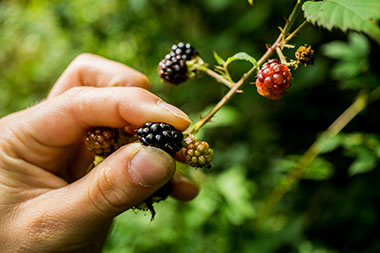Berries are ripening – but is this a warning for wildlife?
Wacky weather could mean early berry batches, but browning and weakened trees – warns Woodland Trust
The Woodland Trust’s Nature’s Calendar project is already receiving records of ripe berries, hastened by the recent heatwave. But the dry weather could spell danger for this year’s wild fruit crops, and the animals that feed on them.

So far the Trust has received 59 records of blackberries ripening, and six records of rowan berries ripening. The baseline average for these events is 27 August and 1 September respectively, meaning the earliest sightings this year have come in around two months earlier than usual.
While the official berry records added to Nature’s Calendar are mainly from England and Wales, a glance would suggest that the Northern Ireland countryside isn’t far behind. The charity, however, needs local people to add their observations to this online project, in order to get a clearer picture of seasonal changes right across the UK.
These early changes in summer scenery could have consequences. If the dry, warm weather continues, the lack of water could mean that berries may be smaller or drop from trees and shrubs. Migratory birds like fieldfare and redwing (arriving around October) could be left with less food if the resident wildlife has taken their share first. Furthermore, trees may tint earlier as they try to preserve water and can also be more susceptible to threats such as tree pests and diseases.
Dr Kate Lewthwaite, citizen science manager for the Woodland Trust, said: “It may be the height of summer, but because of the recent weather, we’re already anticipating signs of autumn. Although we’ve only had a small number of berry records so far, the heat will only encourage more fruit to ripen, and leaves on trees may also start to change colour.
“Given the implications this may have for the berry crop and other species in general, we would urge the public to report the first seasonal events they see to Nature’s Calendar.
“Citizen science is vital in informing our view of changing seasons. This year spring suddenly burst forth in April after being subdued by snow in March. Now, it will be interesting to see how other seasonal timings and species are affected for the rest of 2018.”
Nature’s Calendar is a continuation of seasonal recordings which date back to the 18th century. By recording the timings of natural phenomenon, thousands of people have enabled Nature’s Calendar to become the leading survey into how climate change is affecting UK plants and wildlife. The charity is currently appealing for more recorders from Northern Ireland, where records are scarce.
To find out more about Nature’s Calendar and become a recorder, visit:
https://www.woodlandtrust.org.uk/visiting-woods/natures-calendar/

























